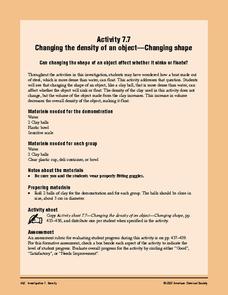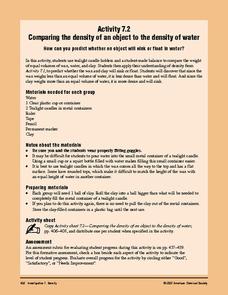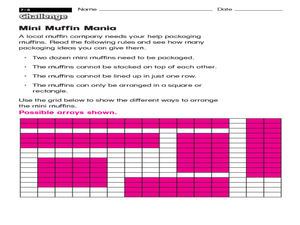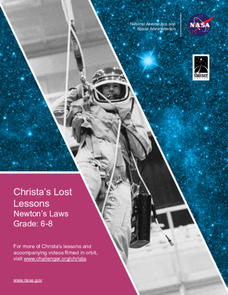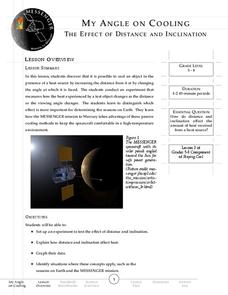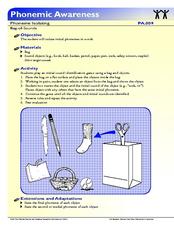Curated OER
Other Objects in the Solar System
In this solar system worksheet, students complete a crossword puzzle given 11 clues about objects in the sky such as asteroids, meteoroids, comets and planets.
Curated OER
Hardware Sort
Students classify various hardware items using the attributes of the objects. In this classification lesson plan, students group objects based on their attributes and explain their classification key.
Curated OER
Sorting Objects
Learners sort six objects into two different groups. They determine which object goes in which circle by writing the names of those objects in each. Use this for review or as a sponge activity.
American Chemical Society
Changing the Density of an Object - Changing Shape
Continuing with the concept of volume and its effect on density, learners now work with a piece of clay to see if they can get it to float in water. This is a memorable end to a seven-part investigation of density. Make sure to check out...
Mathematics Assessment Project
Representing 3-D Objects in 2-D
How does the shape of the surface of water in a container change as water leaks out? After tackling this question, learners take part in a similar activity with more complex figures.
American Chemical Society
Comparing the Density of an Object to the Density of Water
Investigators construct a makeshift balance and compare equal volumes of wax and water. They do the same for clay and water. Then they discover whether the wax and clay will float or sink in water. Ultimately this is a comparison of...
Institute of Electrical and Electronics Engineers
Dispenser Designs
After reading about the history of tape dispensers, learners compare and contrast different dispenser designs. Next, teams work within budgetary and time constraints to design a better dispenser. When finished, each engineer reflects on...
College Board
2009 AP® Computer Science A Free-Response Questions
Coding and decoding is part of the work. Pupils and teachers use the released questions from 2009 to gather information on how topics show up on the AP Computer Science exam. The four questions range from the array data structure to...
Curated OER
Mini Muffin Mania
In this muffins worksheet, students complete different ways to show how to package the muffins in a grid. Students show 6 different ways.
Curated OER
Group Triangles Into Fives Or Tens
In this grouping into fives and tens worksheet, 2nd graders group pictures of triangles by drawing circles around sets of ten. They work with 50 pictures of small, right triangles.
Curated OER
Grouping and Counting Items
Students create equal groups of objects. In this math instructional activity, students create predictions as to how many objects they can get in each equal group. Additionally, students explore and record findings.
Curated OER
Multiplication: Determining the Weight of Multiple Objects
Seventh graders use their knowledge of multiplication and problem solving to determine the total weight of multiple objects. In this multiplication instructional activity, 7th graders weigh various manipulatives, record the weight, and...
Cornell University
Classification
Explore the scientific method of classification. An interactive activity asks learners to create a classification system for a group of objects and develop a flow chart to communicate their systems. In addition, individuals use a...
NASA
Christa's Lost Lesson: Newton’s Laws
How do the laws of motion work in space? Learners explore Newton's laws of motion in different experiments as part of the Christa's Lost Lessons series. They rotate around the room in three stations to experience each law in action using...
Messenger Education
My Angle on Cooling—Effect of Distance and Inclination
When exploring Mars, spacecrafts are exposed to 5-11 times more sunlight than when near Earth. Groups of pupils complete a hands-on activity to explore how distance and angle of the sun affect temperature. Through discussions, they then...
Teach Engineering
Physics Tug of War
Slide books with a little assistance from Newton. Using books, groups create a demonstration of Newton's Second Law of motion. Pupils compare the distance traveled by one and two books when they apply a force to them.
Florida Center for Reading Research
Phonics, Letter-Sound Correspondence: Letter Bag
An activity focuses on final sounds sorting. Scholars pull objects out of a bag, identify what letter sound the object ends with, then draw the picture under the appropriate column.
Florida Center for Reading Research
Phonological Awareness: Phoneme Isolating, The Last Sound Is...
Partners work with real objects as they practice final phonemes. Here's how it works: Partner A silently chooses an object and sounds it out, determining the final phoneme and saying the sound aloud. Partner B examines the group of...
Teach Engineering
Density Column Lab - Part 2
Groups suspend objects within layers of liquids to determine the densities of different liquids and compare them to the densities of objects calculated in Part 1. The groups then carefully test their calculations by layering the...
Florida Center for Reading Research
Phonological Awareness: Phoneme Isolating, Bag-of-Sounds
In pairs, pre-readers take turns holding up objects from a bag. As one child holds up an object, the other names it and says its initial letter sound. They work together to sort the objects into piles based on how they isolated and...
Illustrative Mathematics
Tossing Cylinders
Everyone loves a lesson that involves throwing things around! To understand probability, your experimenters will predict how different cylinder-shaped objects will land when tossed. When the data is collected, they will calculate the...
It's About Time
Center of Mass
Lead your class on an exploration as they locate the center of mass in several oddly shaped two-dimensional objects they create from their imaginations. Pupils also determine the location of the center of mass in three-dimensional...
Florida Center for Reading Research
Phonological Awareness: Phoneme Matching, Sound Train
Make a phonics train filled with matching initial phonemes. Early readers say the name of the objects on each of their cards, identify the initial letter sounds or phonemes, then paste them on a train. They make three trains, which means...
InqueryPhysics
Interpreting Motion Graphs
Every movement in the world can be measured and even motionless objects can be significant indicators of movement. Focus on motion graphs that feature distance vs. time, speed vs. time, and positive and negative acceleration.





